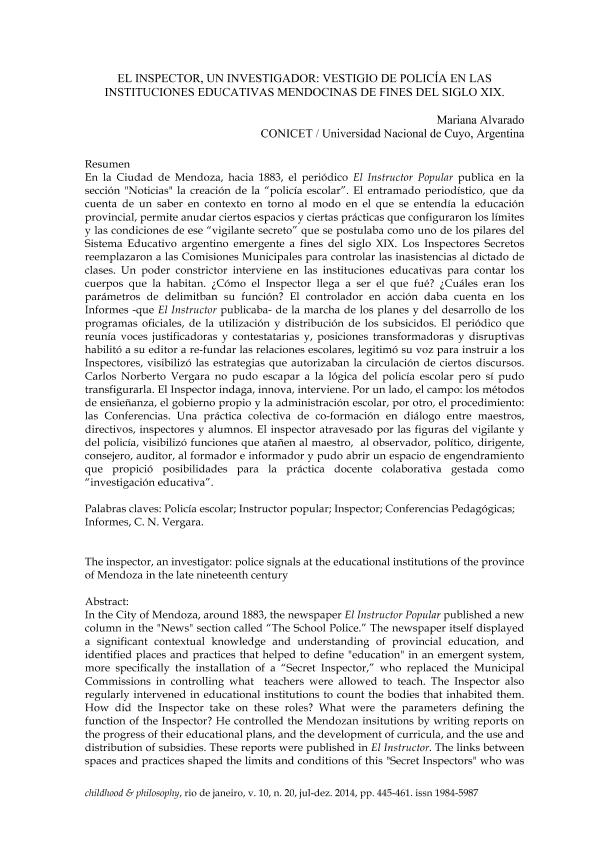Mostrar el registro sencillo del ítem
dc.contributor.author
Alvarado, Mariana

dc.date.available
2018-01-18T21:07:47Z
dc.date.issued
2014-12
dc.identifier.citation
Alvarado, Mariana; El inspector, un investigador: vestigio de policía en las instituciones educativas mendocinas de fines del Siglo XIX.; Universidade do Estado do Rio de Janeiro; Childhood & Philosophy; 10; 20; 12-2014; 445-461
dc.identifier.issn
2525-5061
dc.identifier.uri
http://hdl.handle.net/11336/33898
dc.description.abstract
En la Ciudad de Mendoza, hacia 1883, el periódico El Instructor Popularpublica en la sección "Noticias" la creación de la “policía escolar”. El entramado periodístico, que da cuenta de un saber en contexto en torno al modo en el que se entendía la educación provincial, permite anudar ciertos espacios y ciertas prácticas que configuraron los límites y las condiciones de ese “vigilante secreto” que se postulaba como uno de los pilares del Sistema Educativo argentino emergente a fines del siglo XIX. Los Inspectores Secretos reemplazaron a las Comisiones Municipales para controlar las inasistencias al dictado de clases. Un poder constrictor interviene en las instituciones educativas para contar los cuerpos que la habitan. ¿Cómo el Inspector llega a ser el que fué? ¿Cuáles eran los parámetros de delimitban su función? El controlador en acción daba cuenta en los Informes -que El Instructorpublicaba- de la marcha de los planes y del desarrollo de los programas oficiales, de la utilización y distribución de los subsicidos. El periódico que reunía voces justificadoras y contestatarias y, posiciones transformadoras y disruptivas habilitó a su editor a re-fundar las relaciones escolares, legitimó su voz para instruir a los Inspectores, visibilizó las estrategias que autorizaban la circulación de ciertos discursos. Carlos Norberto Vergara no pudo escapar a la lógica del policía escolar pero sí pudo transfigurarla. El Inspector indaga, innova, interviene. Por un lado, el campo: los métodos de ensieñanza, el gobierno propio y la administración escolar, por otro, el procedimiento: las Conferencias. Una práctica colectiva de co-formación en diálogo entre maestros, directivos, inspectores y alumnos. El inspector atravesado por las figuras del vigilante y del policía, visibilizó funciones que atañen al maestro, al observador, político, dirigente, consejero, auditor, al formador e informador y pudo abrir un espacio de engendramiento que propició posibilidades para la práctica docente colaborativa gestada como “investigación educativa”.
dc.description.abstract
In the City of Mendoza, around 1883, the newspaper El Instructor Popular published a new column in the "News" section called “The School Police.” The newspaper itself displayed a significant contextual knowledge and understanding of provincial education, and identified places and practices that helped to define "education" in an emergent system, more specifically the installation of a “Secret Inspector,” who replaced the Municipal Commissions in controlling what teachers were allowed to teach. The Inspector also regularly intervened in educational institutions to count the bodies that inhabited them. How did the Inspector take on these roles? What were the parameters defining the function of the Inspector? He controlled the Mendozan insitutions by writing reports on the progress of their educational plans, and the development of curricula, and the use and distribution of subsidies. These reports were published in El Instructor. The links between spaces and practices shaped the limits and conditions of this "Secret Inspectors" who was considered one of the pillars of the Argentine education system as it emerged in the late nineteenth century. The newspaper brought together both conventional and and rebellious voices, and both transformative and disruptive positions. Although the Inspector was expected to function both as vigilante and police, it was he who inquired, innovated, and intervened in three dimensions: teaching methods, self-government, discipline and school administration, and he did so through the introduction of conferences. This led to a collective practice of co-education in dialogue between teachers, managers, supervisors and students. He made visible the roles of teacher, observer, political, leader, adviser, auditor, trainer and reporter, and he opened a new space which led to other possibilities for teaching practice understood as "educational research".
dc.format
application/pdf
dc.language.iso
spa
dc.publisher
Universidade do Estado do Rio de Janeiro
dc.rights
info:eu-repo/semantics/openAccess
dc.rights.uri
https://creativecommons.org/licenses/by-nc/2.5/ar/
dc.subject
Policía Escolar
dc.subject
Instructor Popular
dc.subject
Carlos Norberto Vergara
dc.subject
Conferencias Pedagógicas
dc.subject.classification
Estudios Religiosos

dc.subject.classification
Filosofía, Ética y Religión

dc.subject.classification
HUMANIDADES

dc.title
El inspector, un investigador: vestigio de policía en las instituciones educativas mendocinas de fines del Siglo XIX.
dc.title
The inspector, an investigator: police signals at the educational institutions of the province of mendoza in the late nineteenth century
dc.type
info:eu-repo/semantics/article
dc.type
info:ar-repo/semantics/artículo
dc.type
info:eu-repo/semantics/publishedVersion
dc.date.updated
2018-01-03T19:57:44Z
dc.identifier.eissn
1984-5987
dc.journal.volume
10
dc.journal.number
20
dc.journal.pagination
445-461
dc.journal.pais
Brasil

dc.journal.ciudad
Río de Janeiro
dc.description.fil
Fil: Alvarado, Mariana. Universidad Nacional de Cuyo; Argentina. Consejo Nacional de Investigaciones Científicas y Técnicas. Centro Científico Tecnológico Conicet - Mendoza; Argentina
dc.journal.title
Childhood & Philosophy
dc.relation.alternativeid
info:eu-repo/semantics/altIdentifier/url/http://www.e-publicacoes.uerj.br/index.php/childhood/article/view/20687
dc.relation.alternativeid
info:eu-repo/semantics/altIdentifier/url/http://www.redalyc.org/html/5120/512051611012/
dc.relation.alternativeid
info:eu-repo/semantics/altIdentifier/url/https://dialnet.unirioja.es/servlet/articulo?codigo=5001518
Archivos asociados
